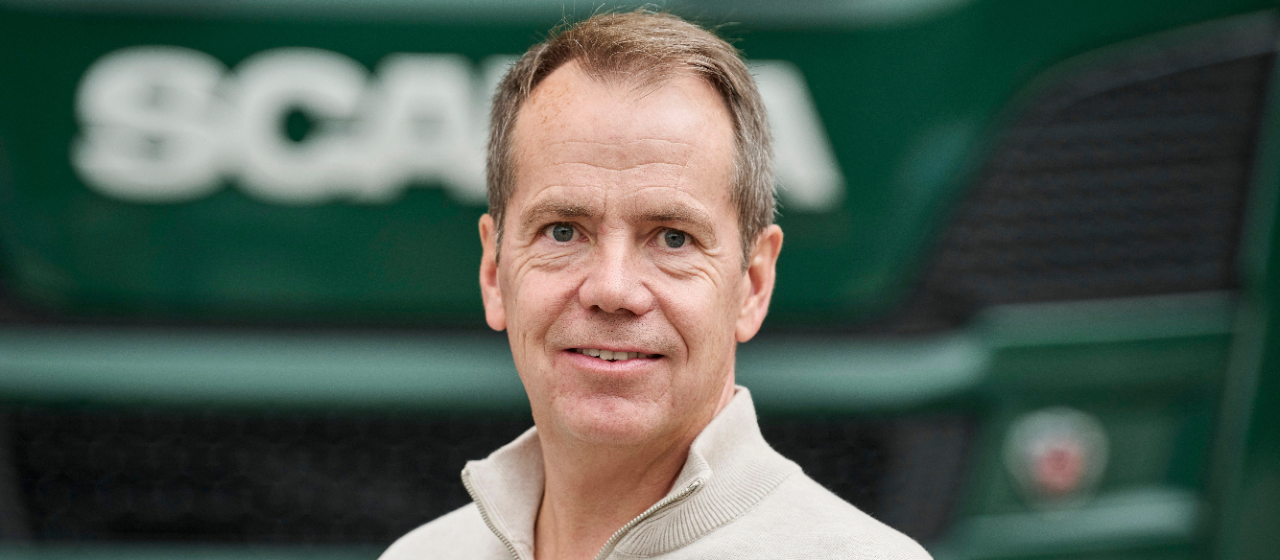
“It’s another piece of the puzzle for a fossil-free transport system”
20 SEPTEMBER 2023
Magnus Gustavsson is a 26-year Scania veteran who’s worked on many interesting jobs for the company. Even so, he feels that his contribution to Scania’s solar-powered truck prototype stands out. “I’m really proud of this project because I want to work towards a sustainable transport system,” he says.
You might expect someone with a 26-year track record at Scania to act as if they’ve seen and done it all. But that’s not the impression you get from 55-year-old Magnus Gustavsson when you speak to him about his involvement in the Scania solar-powered truck project.
For it’s clear that Magnus, who has also had stints in Sales & Marketing, Development Engineering, System Architecture and Electrification, feels a real sense of achievement.
“I’m very proud to have been part of this project because it’s another piece of the puzzle for a fossil-free transport system,” he says. “It’s one of the highlights of my career here that I’ll always remember.”
Magnus’s crucial role
Magnus had a crucial role to play as System Architect for Voltage Class-B (VCB)-related and propulsion battery aspects. His job involved allocating functions and doing so safely, plus establishing the physical architecture of all the parts in the VCB system, the 650-volt system that Scania has in its battery electric trucks.
“Although we had a lot of the parts already, such as the batteries and cooling system, we had to charge the battery with the solar panels and the transfer between the solar-powered trailer battery system and the truck battery system. That was completely new territory for us. So I was doing an architecture around that and identifying the functions needed and also the protocol for the handing over of the function between truck and trailer,” he explains.
Gustavsson was one of only three hardware engineers in the small team that was attached to the project. But, like his software engineer colleague Naomi Anveden-Hertzberg, he was greatly enthused by the ‘start-up’ feel that prevailed.
“It was a very lean project with few participants and quick decisions. We had the ability to make a decision and test it right away in the building so we could implement things quite rapidly. It’s very seldom that you have the opportunity to do that at Scania so it was very exciting,” he says.
“Overall, there was a very good team spirit with a positive approach to making change. It was a great time, actually.”
When asked about project milestones, Magnus mentions the first time that the team transferred power from the trailer to the truck: “Then we could see that we had the part for the whole system to make it work. So it was only a matter of tuning and doing the fixing of the small things but we could see that the system was working.”
But, typically, he celebrated this fantastic achievement quite modestly: “With a cup of coffee, Scania style…”, he says, smiling.
Towards fossil-free transport
“It’s now a really exciting time starting for this project,” says Magnus, who is now working for the benchmarking team and will follow the truck’s progress. “We’ll see how much energy the solar panels can collect with the trailer. It won’t be applicable to everyone but for transport in some industries with shorter haulage applications it will make a great contribution to the energy needed; especially when you consider that are between three and five times as many trailers as there are trucks in Europe,” he says.
As the conversation draws to a close, it’s striking just how much Magnus embraces the vision of a fossil-free transport system, and the possibility that solar cells to batteries may one day play a role.
“I’m really proud of this project because I want to contribute towards a sustainable transport system. I’m becoming more and more aware of how important it is to decarbonise transport.
“I’m also becoming more frustrated about why more people don’t do something and take even small steps. It’s about doing the small things, we all can’t wait for the big changes to happen. Everybody has to contribute and this is what our project aims to do.”